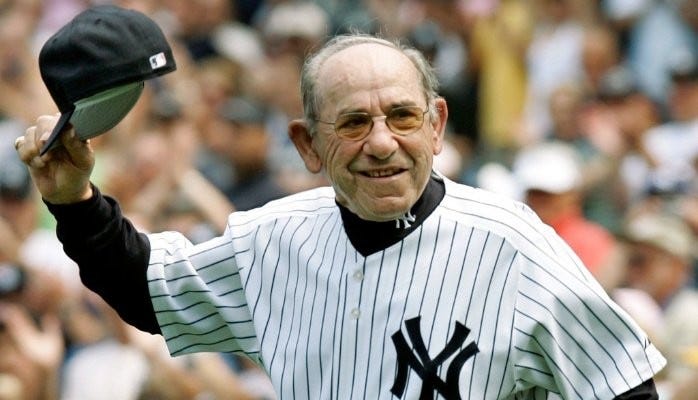What We Can Learn from Yogi Berra
On September 22, we lost Yogi Berra, a titanic figure in American sports and culture. He played in 18 All Star games and was on the winning side of 13 World Series in his capacities as coach, manager, and catcher. Unsurprisingly, he was inducted into the Baseball Hall of Fame in 1972; Americans will never forget his athletic career. I know I won’t.
The first professional baseball game I ever attended was in 1983. My father and I drove to Yankee stadium from New Jersey. Berra was a coach, soon to be named Manager, of the Yankees. (Hush hush, but as a Bostonian and genuine Red Sox fan, it was this experience that prevents me from disliking the Yankees…much to the dismay of neighbors, colleagues, and local friends!).
But beyond his sports greatness, Berra had personality and wit. His amazing ability to dispense folksy yet deeply insightful wisdom in phrase length is perhaps only rivaled by Warren Buffett. In fact, The Yogi Book, a concise and wit-filled written version of his aphorisms, has been a New York Times bestseller. It won’t shock me if it revisits the list again. A quick read of the book reveals the mind of a nuanced, flexible, unconventional thinker who was destined to succeed in many walks of life.
Yogi Berra was a nuanced, flexible, unconventional thinker
As I read through his many famous sayings, five Yogiisms stood out for their relevance to leaders, investors, and those actively managing their careers. The wisdom these messages contain is timeless.
Nobody goes there anymore. It’s too crowded. Yogi’s message here is that we need to think for ourselves. Don’t follow the pack; they may be lemmings. I’m sure many investors would agree that a crowded trade is a dangerous bet. Consensus and agreement should be frightening. In investing and your career, it may be best to be a contrarian. Go where others aren’t. Or as noted by hockey great Wayne Gretzky, “Skate to where the puck is going to be, not to where it has been.”
When you come to a fork in the road, take it. The message here is that it’s easy to suffer analysis paralysis. Don’t. Complexity and tough calls are a fact of life. As overwhelming as they may seem, action actually has the potential to alleviate uncertainty. You can transform ambiguity into insight. And don’t stress about the ideal: perfection can be the enemy of the very good.
We’re lost, but we’re making good time. Yogi loved his job, playing and coaching baseball. The lesson is clear: embrace the journey over the destination. If you’re so focused on where you’re going (winning the World Series or getting that promotion you’ve had your eye on) but can’t stand the day to day, what’s the point? How will you feel if you don’t reach your destination? Let’s not forget my favorite Life Is Good saying: “Not all who wander are lost.” Wandering may in fact lead to a better outcome than anything you could have planned.
The future ain’t what it used to be. Yogi was born in 1925, and bore witness to some of the most dramatic changes this planet has endured, and not just in society, but also in how we imagined what was to come. Accept that change is constant. The future is dynamic, and our expectations will always be shifting. Don’t get left behind with a past version of the future. You’re never going to be completely accurate with predictions, so adjust assumptions frequently.
Baseball is 90% mental; the other half is physical. Yogi recognized the danger of assuming a zero-sum game. Why not think differently? In many situations, we default to an “either-or” assumption. Yogi suggests a “both-and” worldview is sometimes more appropriate. Often it’s these mental constraints that hold back true success. Look beyond them!
Thanks for the advice, Yogi. You’ll be missed.
Vikram Mansharamani is a Lecturer at Yale University in the Program on Ethics, Politics, & Economics. He is the author of BOOMBUSTOLOGY: Spotting Financial Bubbles Before They Burst (Wiley, 2011). Visit his website for more information or to subscribe to his mailing list. He can also be followed on Twitter.




